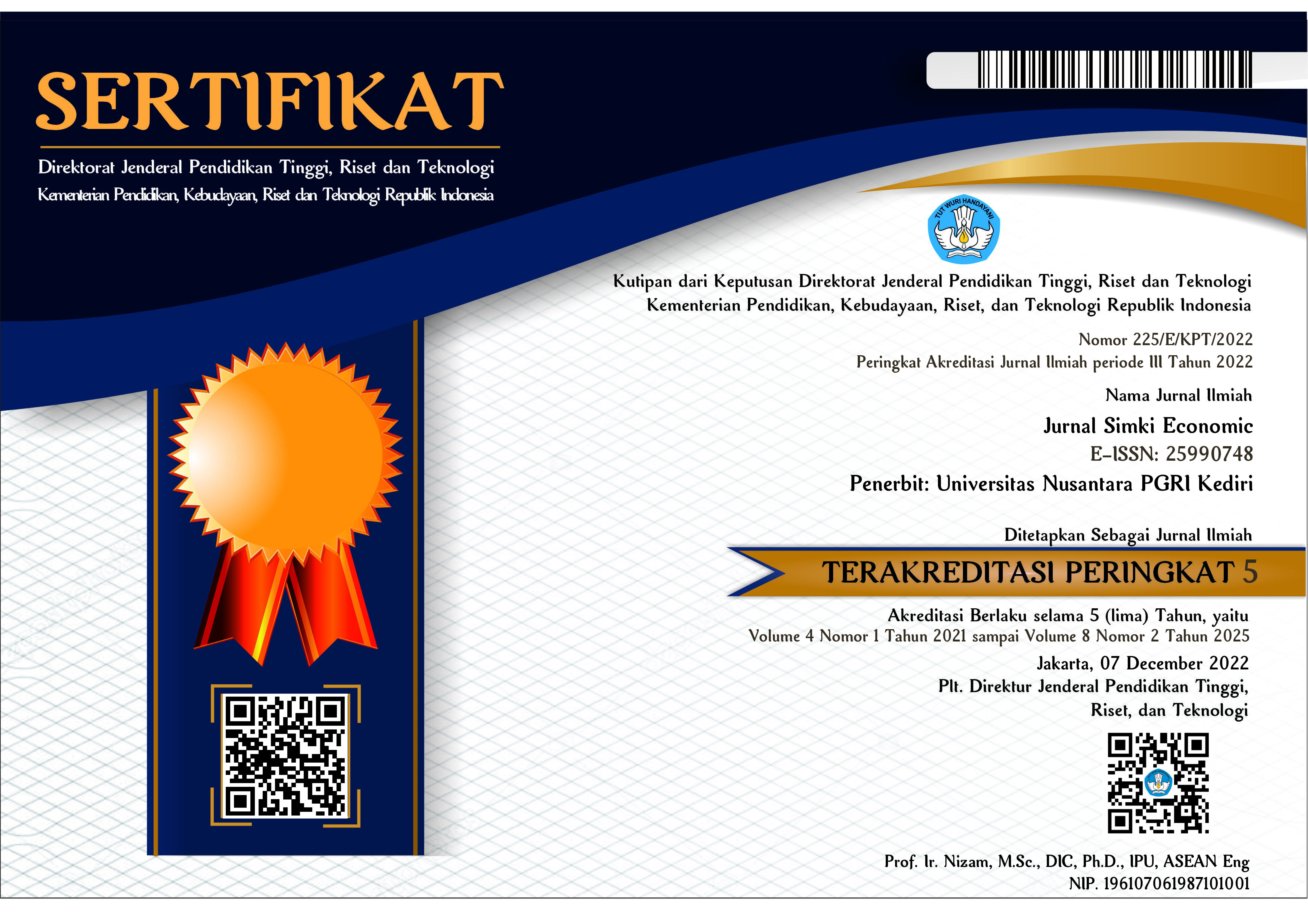Pengaruh Kedisiplinan dan Kompensasi terhadap Kinerja Karyawan
 Abstract views: 548
,
Abstract views: 548
,
 PDF (Bahasa Indonesia) downloads: 663
PDF (Bahasa Indonesia) downloads: 663
Abstract
Employees as human resources have a role to determine the success of the company while the measure to determine the success of the company is determined by employee performance. The purpose of this study was to determine the partial and simultaneous effect of discipline and compensation variables on employee performance. The population in this study were employees in a travel and tours in the city of Surabaya, amounting to 29 people and used as a whole as respondents. The analysis tool is multiple linear regression. The research findings state that discipline has a significant influence on employee performance. Compensation also has a significant effect on employee performance. Both simultaneously affect the dependent variable.
Downloads
References
Akhtar, C. S., A. Aamir, M. A. Khurshid, M. M. Abro, & J. Hussain. 2015. Total Rewards and Retention: Case Study of Higher Education Institutions in Pakistan. Procedia –Social and Behavioral Sciences, 210(1), 251-259.
Arifin, S., R. Mardikaningsih & Y. R. Al Hakim. 2017. Pengaruh Kedisiplinan, Kompetensi, dan Motivasi Kerja terhadap Kinerja Karyawan, Management & Accounting Research Journal, 2(1), 43-50.
Arifin, S., A. R. Putra, & C. Fajar B. H. 2019. Pengaruh Kompetensi, Kompensasi dan Kepemimpinan terhadap Kinerja Karyawan, Ekonomi, Keuangan, Investasi dan Syariah, Vol. 1, No. 1 September, 23-32
Banker, R. D., S.Y. Lee, G. Potter, & D. Srinivasan. 2000. An Empirical Analysis of Continuing Improvements Following the Implementation of a Performance-based Compensation Plan. Journal of Accounting and Economics, 30(3), 315-350.
Brown, M. P., M. C. Sturman & M. J. Simmering. 2003. Compensation Policy and Organizational Performance: The Efficiency, Operational, and Financial Implications of Pay Levels and Pay Structure. Academy of Management Journal, 46(6), 752-762.
Darmawan, D. 2015. Peranan Motivasi Kerja, Kedisiplinan, dan Lingkungan Kerja terhadap Kinerja Guru SD di Kecamatan Gempol Kabupaten Pasuruan, Jurnal Ilmiah Manajemen Pendidikan Indonesia, 1(3), 113-122.
Darmawan, et al. 2020. The Quality of Human Resources, Job Performance and Employee Loyalty, International Journal of Psychosocial Rehabilitation, 24(3), 2580-2592.
Darmawan, D. & R. Mardikaningsih. 2021. Kepuasan Kerja: Teori dan Studi Ilmiah. Yayasan Pendidikan Cendekia Muslim, Solok.
Darmawan, D. 2021. Perilaku Organisasi, Metromedia, Surabaya.
Dessler, G. 2013. Human Resource Management 13th Edition. Pearson, New Jersey.
Gunawan, A. 2015. Perilaku Organisasi, Spektrum Nusa Press, Jakarta.
Herpen, V. M., V.M. Praag, & K. Cools. 2005. The Effects of Performance Measurement and Compensation on Motivation: An Empirical Study. De Economist, 153(3), 303-329.
Issalillah, F. 2020. Kinerja dan Tenaga Kerja, Metromedia, Surabaya.
Khan, I., M. Shahid, S. Nawab, & S.S. Wali. 2013. Influence of Intrinsic and Extrinsic Rewards on Employee Performance: The Banking Sector of Pakistan. Academic Research International, 4(1), 282-291.
Mardikaningsih, R. 2013. Pengukuran Kinerja Dosen berdasarkan Penilaian Mahasiswa, Jurnal Ilmu Sosial, 6(1), 15-26.
Mardikaningsih, R. 2014. Kinerja Karyawan dan Faktor-Faktor yang memengaruhinya, Jurnal Ilmu Sosial, 7(2), 73-84.
Putra, A. R., E. Retnowati & E. A. Sinambela. 2019. Pengaruh Komunikasi Kerja dan Integritas terhadap Kinerja Pegawai, Ebis, Jurnal Ekonomi Bisnis, 12(1), 23-34.
Qureshi, M O., & S. R. Sajjad. 2015. An Empirical Analysis of The Impact of Compensation on Job Performance and Work-Family Conflict in the Kingdom of Saudi Arabia - A Correlation Model. European Scientific Journal, 11(4), 1857-7881.
Santosa, A. & D. Darmawan. 2002. Hubungan Kepemimpinan, Budaya Organisasi dan Kinerja Karyawan, Jurnal Ilmu Manajemen, 3(2), 81-92.
Sinambela, E. A., Y. R. Al Hakim, & M. Irfan. 2019. Pengaruh Kedisiplinan dan Komunikasi Kerja terhadap Kinerja Karyawan, Jurnal Ekonomi, 15(2), 308-320.
Wahyudi, I, D. Bhaskara, D. Darmawan, Hermawan & N. Damayanti. 2006. Kinerja Organisasi dan Faktor-Faktor Pembentuknya, Jurnal Ekonomi dan Bisnis, 4(2), 95-108.
Copyright (c) 2021 Ernawati, Arif Rachman Putra

This work is licensed under a Creative Commons Attribution 4.0 International License.














